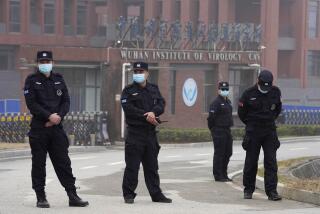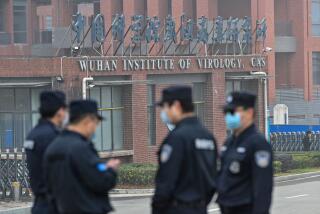Report Is Critical of Security at A-Weapons Labs
WASHINGTON — The Energy Department failed to conduct background checks on hundreds of Russian and Chinese scientists, officials and other visitors to the three U.S. nuclear weapons laboratories, a congressional report says.
Some of the individuals allowed access to the three weapons labs--Lawrence Livermore in California and the Los Alamos and Sandia laboratories in New Mexico--were later shown to have “suspected foreign intelligence connections,” the General Accounting Office said.
At two of the nation’s three nuclear weapons labs only 5% of the visitors--often scientists, weapons experts or researchers--were put through background checks from 1994 through 1996, the GAO said. The report was obtained Thursday in advance of its planned release today.
Auditors from the congressional watchdog agency examined security checks on visitors from 22 countries listed by the Energy Department as “sensitive.” A majority of the visits, 3,701, were by Russians or Chinese.
“By checking the backgrounds of so few visitors from sensitive countries, particularly to Los Alamos and Sandia, DOE limits the collection of basic counterintelligence data and may be unknowingly allowing significant numbers of visitors with questionable backgrounds into its weapons laboratories,” the GAO concluded.
Of the 1,464 visitors from China, only 199, or fewer than 2%, were checked. Of the 2,237 visitors from Russia, 451 visitors, or 2%, were checked, the GAO auditors said.
Their review of FBI and DOE data “showed that some of the individuals without background checks had suspected foreign intelligence connections.”
The report also criticized other lapses, including allowing foreign visitors after-hours access and leaving sensitive information in areas accessible to the visitors.
At one lab, six boxes of papers marked “sensitive material” were left in a hall accessible to foreign visitors. Los Alamos and Sandia permitted unescorted access to “controlled areas” after hours.
The report also cited the inadvertent release of classified information by lab employees during unclassified workshops or, in one case, in a departmental newsletter.
The Energy Department, in a written response, said it is already taking steps to improve security.
More to Read
Sign up for Essential California
The most important California stories and recommendations in your inbox every morning.
You may occasionally receive promotional content from the Los Angeles Times.










